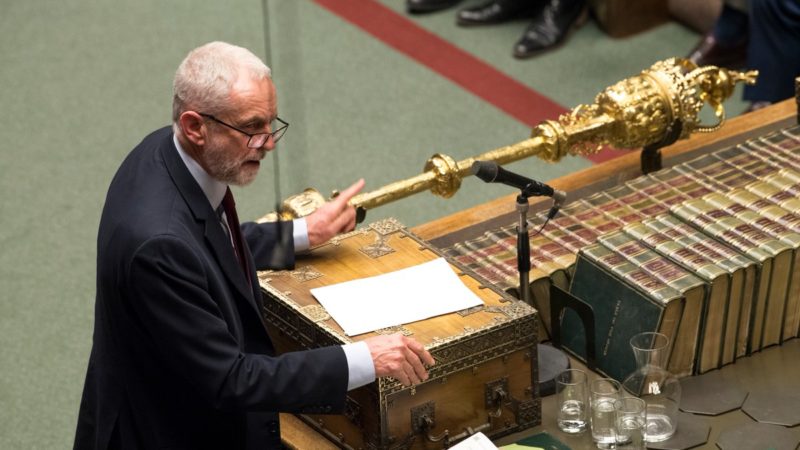
Below is the full text of Jeremy Corbyn’s response to the government’s statement on Iran in the House of Commons today.
I thank the Secretary of State for an advance copy of his statement. Could he tell us where the Prime Minister is and what he is doing that is so much more important than addressing parliament on the assassination of Iranian General Qassem Suleimani, an extremely dangerous and aggressive act that risks starting yet another deadly war in the Middle East?
On Friday I sent the Prime Minister a letter posing a series of questions. He has not answered any of them. Instead, today he is hiding behind his Defence Secretary. Isn’t the truth that he is scared to stand up to President Trump because he has hitched his wagon to the prospect of a toxic Trump trade deal?
Instead, at this highly dangerous moment, we find the government giving cover and even expressing sympathy for what is widely regarded as an illegal act, because they are in hock to Trump. This assassination puts British troops and civilians, as well as the people of the region, in danger.
Mr Speaker, I have long spoken out against the Iranian government’s human rights record. This is not a question of Suleimani’s actions or record in the region. Whatever the record of any state official, the principle – and the law – is that we don’t go around assassinating foreign leaders. Without the clear demonstration of an immediate threat, it is illegal.
So does the government regard the assassination as legal under international law? If so, how? And do the lawyers in the foreign office and the ministry of defence regard it as legal? If he really believes this was an act of self defence what evidence has he or the Prime Minister seen of the imminent attack on the US?
He says that the US is “confident” attacks were imminent but US officials have been quoted in the press saying the evidence is “razor thin”. How would he describe it? In the past few days, the US President has threatened to target Iranian cultural sites and attack Iran in a manner that is, to quote him directly, “disproportionate”. Both of these actions would be war crimes and yet still the government refuses to condemn such threats.
On Sunday the Foreign Secretary said the onus was entirely on Iran to de-escalate. I wonder, if Iran had assassinated an American general, whether the British government would be telling Washington that the onus was entirely on the US to de-escalate?
Mr Speaker, we talk about this as a conflict between the US and Iran but the worst consequences are likely to be felt by Iraq, a country on the brink of further terrible violence and instability.
President Trump has threatened Iraq with “sanctions like they’ve never seen before” after its elected parliament voted to ask US and other foreign forces to leave their country.
And he has said he will not withdraw entirely unless the US is compensated for an “extraordinarily expensive air base” that was actually built by Saddam Hussein in the 1980s. This is outrageous.
The Prime Minister, when he finally resurfaced from his trip, said he was committed to the sovereignty of Iraq. So will the Secretary of State confirm that the government will respect Iraqi sovereignty if the Iraqi government asks British forces to leave?
Mr Speaker, we know the British government wasn’t consulted by the Trump administration in advance, despite the British interests at stake.
What is the government doing to secure the release of Nazanin Zaghari-Ratcliffe and other dual nationals currently in detention in Iran? This must be a terrifying time for them and their families.
It is not in anyone’s interests for this to escalate to all-out war. All sides should exercise maximum restraint and allow for meaningful dialogue led by the UN Secretary General’s office. To prevent war we need a strong plan for diplomacy. So is the government in contact with the UN secretary general?
And let’s not forget, Mr Speaker that there was a diplomatic plan – the Iran nuclear deal. It was working until President Trump ripped it up. Mr Speaker, time and again over the last two decades the political and military establishment has made the wrong call on military intervention in the Middle East.
Many of us opposed the disastrous invasion of Iraq in 2003 and the failed invasion of Afghanistan in 2003. And I opposed the catastrophic bombing of Libya in 2011. Have we learned nothing? This House must rule out plunging our country into yet another devastating war at the behest of another state.




More from LabourList
Scottish Parliament elections 2026: Full list of Labour candidates for Holyrood
‘As metro mayors gain power, Labour must tighten political accountability’
Letters to the Editor – week ending 22 February 2026